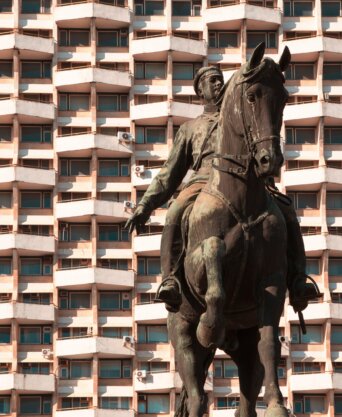- About
- Topics
- Picks
- Audio
- Story
- In-Depth
- Opinion
- News
- Donate
- Signup for our newsletterOur Editors' Best Picks.Send
Read, Debate: Engage.
| topic: | Colonialism |
|---|---|
| located: | Russia, Uzbekistan, Ukraine, Kazakhstan, Georgia, Kyrgyzstan |
| editor: | Andrew Getto |
The Russian language cements Moscow’s influence across an extremely large area. A Russian tourist, not particularly fond of learning languages, can feel almost at home in Latvia, an EU member state; an IT worker from Belarus can find a job that pays twice as much in Moscow without having to learn a new language. But sometimes language isn’t a tool of cooperation - it’s a weapon of war. Just recently the Kremlin brandished this sword once again, pointing it at its closest allies.
Last July, in Kyrgyzstan, a small former-Soviet republic in the mountains of Central Asia, a nine-year-old boy was beaten by Kyrgyz children in a summer camp, allegedly, for being the only ethnic Russian. The Russian government media readily picked up the story. The head of the Russian Orthodox Church, Patriarch Kirill, called the boy “a defender of faith,” and his family was promised help to move to Russia.
Then, in August, a Kyrgyz man in the capital Bishkek threw a calculator at a young woman behind the counter for addressing him in Russian. Pro-Kremlin media turned on the “Russians are oppressed” tune, which soon grew even louder. Local nationalists in Kazakhstan, Central Asia’s most powerful nation, started releasing videos of “language patrols” harassing Russian speakers in public areas.
There will always be some tensions between two neighbouring nations, but these hate crimes are hardly systemic issues. Neither country has any reasons to irritate Moscow. The Central Asian countries were quick to punish the nationalists. Money transfers from Russia account for a third of Kyrgyzstan’s GDP. Kazakhstan is an even more important ally, which has a similar authoritarian system and 7,500 kilometers of border with Russia. Still, Russian politicians, including parliament Speaker Vyacheslav Volodin were infuriated.
The Kremlin wants to be seen as the champion of all Russians across the former USSR. For decades, it has been opposing the tough citizenship policies of Latvia, Lithuania and Estonia. These are aimed at not recognising ethnic Russians, who moved there after the 1940 occupation, as full citizens unless they pass language and history tests.
But the most notable example is Ukraine. The country’s east and south have historically been Russian-speaking areas. Moscow has been channeling its propaganda to these regions and decades of soft-power operations culminated in the occupation of Crimea and war with the self-proclaimed Donetsk and Luhansk republics. Moscow has been hinting that it might treat other foreign territories as its own at any moment.
“If some republic joined the Soviet Union, but got a huge amount of […] traditionally, historically Russian territories, and then suddenly decided to leave the Union, it should’ve left with what it came in. Instead of dragging gifts from the Russian people away with it,” said President Vladimir Putin in 2020.
After the invasion of Crimea, Russia’s Central Asian neighbours realised that this is not a hollow threat. Northern Kazakhstan, for instance, has a large Russian-speaking population, and Russian nationalist forces have long been eyeing its annexation as part of Southern Siberia. Seeing this, Central Asian nations have been slowly but staunchly moving towards greater cultural independence from Russia, including in their languages. The Uzbek language has already changed from the Cyrillic alphabet to the Latin, and the Kazak language is set to do the same in 2023.
Under the USSR, there were 14 national Soviet republics dependent on the main one - Russia. After the fall of the Soviet Union, three Baltic nations immediately turned towards Europe; then the Kremlin lost Georgia; then Ukraine. There is no guarantee that Central Asian allies will not follow suit, if they perceive their powerful neighbour as a threat.
But the Kremlin’s challenge of imposing their language is also a domestic one : there are many national autonomies within Russia that have their own languages, such as Tatarstan, which has a population of four million Tatar speakers.
An important lesson from history is that nationalist rhetoric and the imposition of one language in a multi-ethnic state can backfire dramatically.
Image by: Maria Lupan
